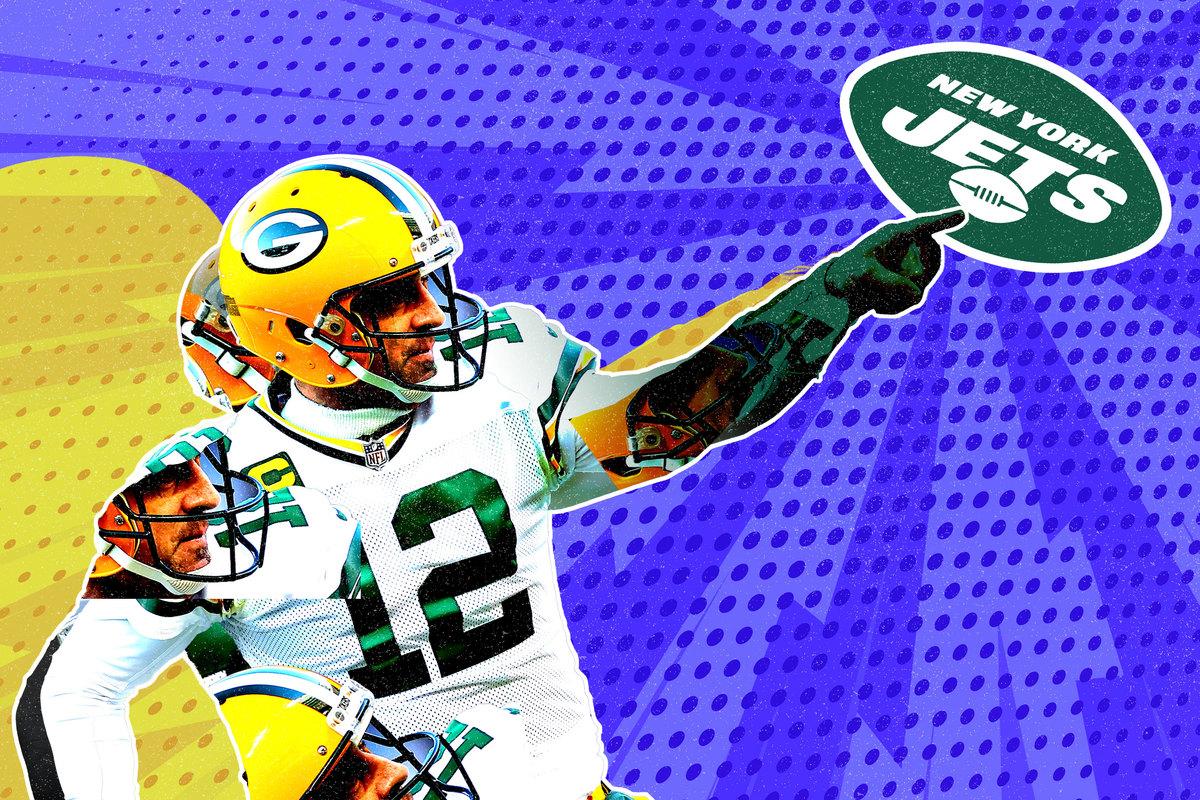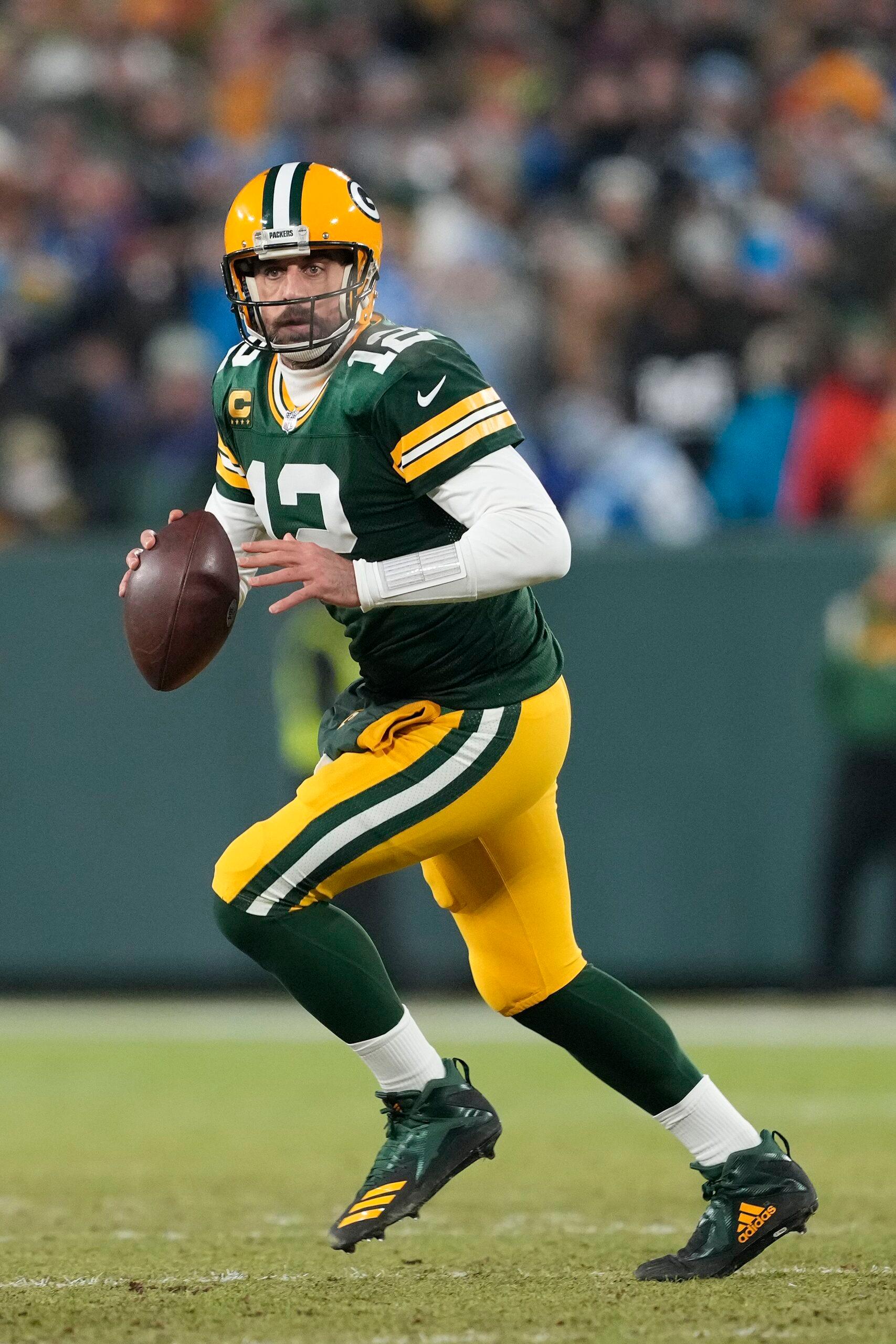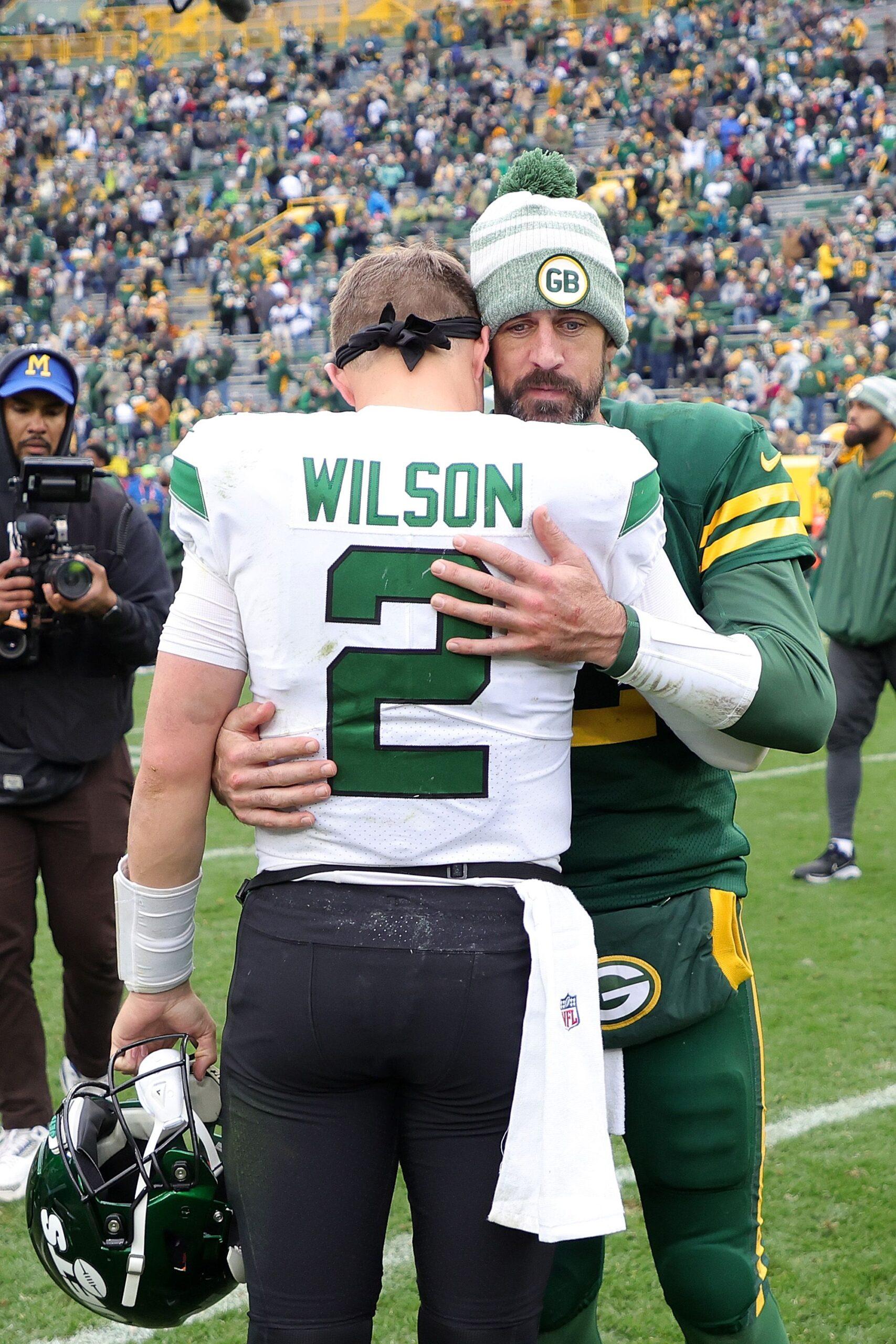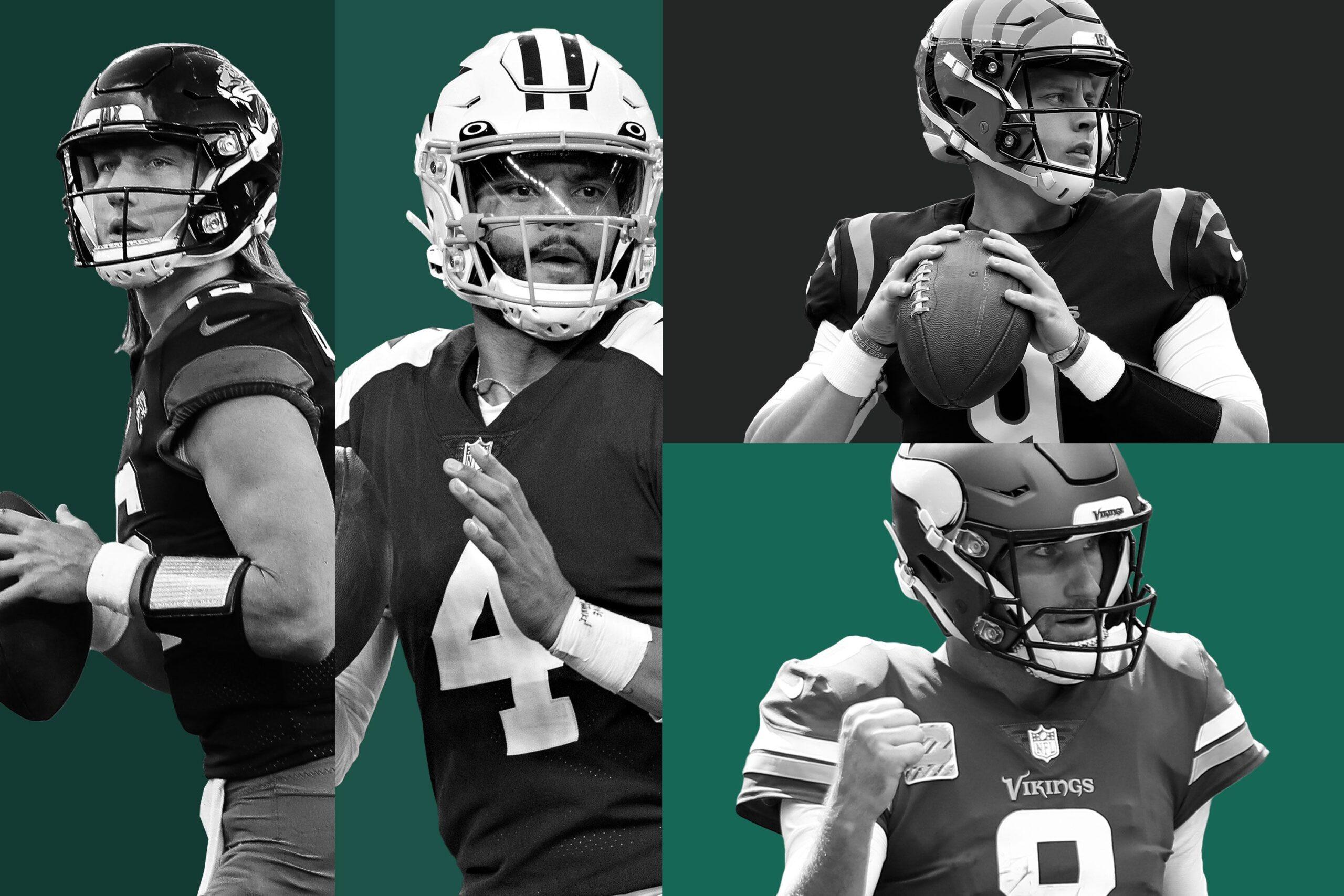
Editor’s note: This story was updated following the Jets’ hiring of Nathaniel Hackett to be the team’s new offensive coordinator.
After the Detroit Lions eliminated the Green Bay Packers from the postseason on Sunday night, rookie Lions receiver Jameson Williams approached Aaron Rodgers and asked for his jersey. “I’m gonna hold on to this one,” Rodgers said, in audio captured by Sunday Night Football’s mics. Rodgers would later elaborate on keeping the jersey in his postgame press conference. “It’s a night game, Lambeau, Week 18,” Rodgers explained. “There’s just certain jerseys you like holding on to.”
Was Rodgers merely being sentimental? Or is there more to it? For the third year in a row, we are left wondering whether Rodgers, 39, will want to continue wearing his Packers jersey next season and whether the Packers will want to keep him in one. While he just signed a contract extension with the Packers last offseason, the timing might be best for everyone involved—Rodgers, Jordan Love, and Green Bay—if Rodgers moves on this offseason.
A survey of the NFL landscape reveals that perhaps the best trade partner on the market would be the New York Jets. A Rodgers-to–New York deal would be a full-circle story arc after the Jets traded for Brett Favre 15 years ago, cementing Rodgers as the Packers starter. New York would provide a fresh start for Rodgers in the final chapter of his Hall of Fame career, solve the Jets’ massive quarterback problem, and give the Packers a chance to begin the Jordan Love era. And this match looks as likely as ever now that the Jets have hired Nathaniel Hackett to be their offensive coordinator. Hackett, who was fired after a disastrous one-year tenure as the Broncos’ head coach, served as Green Bay’s offensive coordinator when Rodgers won MVP in back-to-back seasons in 2020 and 2021, and the two had a strong relationship.
In November 2020, Rodgers told reporters that, “There is nobody in the building who brings me more joy or is more fun to be around than Nathaniel Hackett.” And this Rodgers quote helped fuel Rodgers-to-Denver speculation last offseason, and it could do the same now in New York: “I hope [Hackett] doesn’t go anywhere, unless I do.”
Rodgers’s Options
Rodgers has discussed retirement a lot the past few years. He was noncommittal about returning to the NFL after the Packers lost a win-and-in regular-season finale on Sunday night. But he did say any decision about his status would need to be mutual between him and the team, echoing what he said in November before the Packers went on a run that nearly landed them in the playoffs.
Money could certainly be a consideration: Rodgers is set to earn $60 million in cash if he returns to play in 2023. That isn’t NFL fake-contract funny money. We’re talking a $58 million direct deposit as a bonus for simply being on the roster. Even for a guy who has already made about $300 million in salary (minus taxes), an extra $60 million for one more season is probably enticing.
“I’m a realist,” Rodgers said after the game Sunday night. “I understand where we are as a team. There could be changes with some of the older guys. It could be time to step away. But I could take some time and say, ‘Hell no, man. I need to get back out there and go on another run.’ But I need to see what it feels like when I am away from it.”
It’s not unreasonable to think that Rodgers will want to know what the 2023 Packers will look like as he’s considering his options. Veterans like pass catchers Allen Lazard, Randall Cobb, and Robert Tonyan, whose contracts have each expired or will be void, might all be done in Green Bay after this season. Sure, Rodgers could return to Green Bay and try to make another run with young players like Christian Watson and Romeo Doubs. But for the Packers, that is more complicated than it sounds.
What the Packers Must Consider
At some point, the Packers will have to choose between Rodgers and Love. And because of the unique way that Rodgers’s contract is structured, they will probably have to make that choice this offseason.
If the Packers bring back Rodgers for 2023, it would actually be a two-year commitment. Last offseason, Green Bay signed Rodgers to a mammoth contract extension: essentially a $150 million deal for three seasons, paying Rodgers an average of $50 million per year. Because of the unique way Rodgers’s contract is structured, he would almost certainly be untradable next offseason (the Packers would have to take an untenable $68 million dead cap hit to make the money work; that’s substantially more than the record $40.5 million the Falcons took on this year after trading Matt Ryan). Even if Rodgers were to retire after next season, it would still cost the Packers $68 million in dead cap, according to CBS contract analyst Joel Corry, who did a deep dive on Rodgers’s contract, although they could split that over two years. And if Rodgers plays two more years and then retires, his dead cap figure would be more than $76 million. In other words, once Rodgers gets his $58 million roster bonus by Week 1 of the 2023 season, he will be essentially untradable.

The Packers could easily stare at those numbers and decide that Rodgers is worth it. But committing to Rodgers for 2023 essentially runs out the clock on Love’s rookie contract.
Green Bay traded up to draft Love in the first round in 2020, and he has patiently sat on the bench and waited for his turn for three years (the same amount of time that Rodgers sat behind Favre). There has already been some buzz in the Green Bay media that Love might request a trade if Rodgers returns in 2023 (it’s also notable that Love and Rodgers are represented by the same agency, Athletes First).
If the Packers pick up Love’s fifth-year option this May, they would pay him about $20 million guaranteed in 2024, according to Over the Cap’s projections. That is a lot of money to pay someone to sit on the bench.
The easiest solution could be that Rodgers plays one more season in 2023, and then Love takes over in 2024. But while that works in theory, it could hurt Green Bay’s salary cap in the short and long term. In 2024, Green Bay would owe Rodgers $68 million in dead money while paying Love about $20 million. Beyond 2024, it might not be a smart long-term football decision to delay Love’s career as a starter by another year. In 2024, Love would be playing in the final (and most expensive) year of his rookie deal. Is that enough time for the Packers to know whether they’d want to extend Love in 2025? Could he choose to leave as a free agent? That is every general manager’s nightmare.
In other words, if the Packers want to have Love as their starting quarterback, they should do that in 2023. And if they want to trade Rodgers, they have to do that in 2023. So Green Bay must choose between Love and Rodgers.
If the Packers’ brain trust of president Mark Murphy, GM Brian Gutekunst, and head coach Matt LaFleur feels that the Packers can make the leap from 8-9 in 2022 to Super Bowl contenders in 2023, perhaps they see bringing Rodgers back as a no-brainer. The easy instinct is to keep the Hall of Famer who was the back-to-back MVP and trade the kid who has barely played NFL football. Green Bay’s defensive problems this season came from coaching, not talent. By December, the Packers seemed to have finally figured some things out offensively. They ran the ball well, ranking third in rushing success rate from Week 12 to Week 18. Watson and Doubs both improved mightily after early-season struggles and injuries. It is not hard to see the Packers bouncing back to reclaim the NFC North in 2023. And Rodgers’s understandably pensive demeanor on Sunday night notwithstanding, he certainly seemed to be having a lot more fun at the end of this season than he was in the beginning.
But Green Bay is an organization that plays the long game.
Flipping the Packers’ 24-year-old quarterback for a second-rounder while their 39-year-old quarterback openly discusses retirement for the third year in a row does not sound like a long-term plan. As bad as it sounds to eat $40 million to trade Rodgers for some draft picks, eating $68 million for one more year of Rodgers and no draft picks sounds worse.
A major component to this is how Love has played in practice. That’s for LaFleur to judge. Patrick Mahomes looked good enough while running the scout team in 2017 that the Chiefs traded away Alex Smith and made Mahomes the starter in his second year. Rodgers developed enough behind Favre in his three years on the bench that the team reportedly offered Favre $20 million to go away in 2008—then stuck with Rodgers and traded Favre when Favre wanted to come back. Love isn’t Mahomes or Rodgers. But only the Packers know how good (or not good) Love has looked in three years on the bench.
Who Should Consider Trading for Rodgers?
Now this is where it gets fun. Let’s say the Packers entertain trading Aaron Rodgers. Let’s also say that Rodgers wants to play and is content to move on. Where should they send him?
We can immediately rule out the other teams in the NFC North—the Vikings, Lions, and Bears—since the Packers would never send him somewhere within the division. The Packers would probably want to avoid seeing him in the playoffs, so they likely would not want to trade him to any NFC team, period. That probably rules out the 49ers, who have knocked the Packers out of the playoffs four times since 2011. It’s hard to imagine that the Saints, who don’t have a quarterback under contract for 2023 other than Taysom Hill (LOL), would have the draft capital or salary cap space to pull this sort of trade.
That leaves AFC teams that are good enough that Rodgers would want to play for them but that are not currently committed to a franchise quarterback. We can quickly rule out the Chiefs, Chargers, Broncos, Bengals, Browns, Bills, Jaguars, and Steelers, who either are happy with their quarterbacks or just made big financial or draft capital investments in them. The Dolphins and Ravens have not yet signed Tua Tagovailoa and Lamar Jackson to their respective contract extensions, but it feels safe to say that those teams wouldn’t be in the market for Rodgers either.
We can also rule out a couple of teams that are not good or stable enough to attract Rodgers: The Texans are a disaster (and are in line to have their choice of quarterbacks in the 2023 draft). Ditto for the Colts, who are also in position to draft a QB this year. And while the Patriots could potentially be interested in quarterbacks better than Mac Jones, it’s hard to imagine Rodgers ascribing to the Patriot Way (would Bill Belichick let Rodgers go on The Pat McAfee Show for an hour every week?)
That leaves three teams: the Raiders, the Titans, and the Jets.
The Raiders were reportedly on Rodgers’s list of trade destinations last year. And after benching Derek Carr late in the season, they clearly have plans to move on with the position. Perhaps the Raiders are close enough to Los Angeles, where Rodgers lives in the offseason, to pique his interest. But the Raiders’ 2022 season was a massive disappointment, Josh McDaniels hasn’t inspired much confidence as a head coach, and there would also be the supreme awkwardness of the Packers dealing Davante Adams to the Raiders this year, then turning around and sending Rodgers, too. The whole thing would just be weird—and Rodgers and Adams would have an even more flawed team than the one they’d left. And even if the Raiders want a veteran QB, why trade for Rodgers if they could sign Tom Brady for free?
The Titans are scrappy. Mike Vrabel is an amazing head coach. But this team recently fired GM Jon Robinson and face-planted their way into a seven-game losing streak to miss the playoffs. After years of being unhappy with the Packers’ receiving corps, would Rodgers leave Green Bay to work with young Treylon Burks, old Robert Woods, and undrafted Nick Westbrook-Ikhine? Derrick Henry turned 29 this January. Intriguing, but unlikely.
That leaves one last AFC team: the New York Jets.
Like the Titans, New York collapsed down the stretch. After starting 6-3, the Jets ended up 7-10 on the season and failed to score a touchdown in their final three games. But those offensive struggles were mostly due to awful quarterbacking from Zach Wilson, Mike White, and Joe Flacco.
If you’re seeking a team with a Super Bowl–caliber supporting cast that is a veteran quarterback away from contention, look no further. The Jets might have the Offensive Rookie of the Year in receiver Garrett Wilson and the Defensive Rookie of the Year in cornerback Sauce Gardner. Garrett Wilson and 2021 second-round pick Elijah Moore, a receiver, look like foundational pieces at the wide receiver spot. Combine them with running backs Breece Hall (once he returns from his season-ending knee injury), Michael Carter, and Bam Knight, and the Jets might have the best young skill group in the NFL. And New York has an elite defensive line rotation anchored by Quinnen Williams, who established himself as a top-tier defensive tackle in 2022.
Admittedly, the Jets offensive line is not as strong as Green Bay’s. As many as four of the Jets’ five offensive line spots could turn over this offseason, which is a big concern for a veteran quarterback. But every team has weaknesses, and the Jets are strong nearly everywhere else. And if the Packers do want to move Rodgers, there aren’t many places that would offer him a better situation.
And the time for the Jets is now. They have so many of their skill position players, anchor offensive lineman Alijah Vera-Tucker, and Gardner on rookie contracts. In a few years, all of those players could be among the highest paid at their positions, and Jets fans might look back and rue how much talent they had together for so cheap. As Jets fans know well from the Rex Ryan–Mark Sanchez teams that made back-to-back AFC championships in the winters of 2010 and 2011, a young, elite defense can be dominant, but it can also disappear quickly.
The question isn’t if the Jets will add a veteran QB; it is when. Neither Zach Wilson nor White is good enough to entrust a Super Bowl run to. Signing pending free agent Jimmy Garoppolo, given his injury history, would mean that the Jets would just be back to White midway through the year. Perhaps the Jets could trade for Carr, who has no remaining guaranteed money in his contract with the Raiders. But that feels like an uninspiring half measure. Would Jets fans rather trade a second-rounder for Carr or a first- and a second-rounder for Rodgers?
Teams could easily, and fairly, wonder whether Rodgers is cooked—this season, his passing yardage and touchdowns were down significantly and his interceptions were up from his past two MVP seasons, and his passer rating (91.1) was his lowest since he became the Packers’ starter. But we were wondering the same thing about both Rodgers and Brady after the 2019 season. Brady left the Patriots, went to Tampa Bay, and immediately won the Super Bowl, showing how much more he had left with a better supporting cast. Rodgers went back to his core mechanics and won back-to-back MVP awards in 2020 and 2021. Now both the Packers’ and Bucs’ core groups have broken down, and we are once again wondering whether Brady and Rodgers are the problem. It seems like a decent bet that surrounding them with better players will lead to better seasons. And even if Rodgers is diminished at age 39, so what? He’d merely be five times better than White, rather than 10 times better?

Luckily for the Jets, they should be able to get the best possible information about why Rodgers had a down year, given the long and close relationship between LaFleur and Jets head coach Robert Saleh. (The Jets offensive coordinator was LaFleur’s younger brother, Mike, but he and the team parted ways on Wednesday.) Surely the Jets wouldn’t make a deal without getting a real, trustworthy assessment of how much Rodgers has left.
A first-rounder is probably the floor for Rodgers. The Broncos’ package for Russell Wilson—two first-rounders plus two second-rounders and change—is probably the ceiling. (Rodgers is better than Wilson, but he is also more expensive and contemplates retirement every offseason, whereas Wilson committed to a five-year extension.) Somewhere within that range, Rodgers might be available.
The only other veteran QB who could make more sense for the Jets is, well, Brady. He is set to become a free agent in 2023. If Brady is looking for the best football situation, it would make sense for him to go either to San Francisco, near where he grew up and where his parents still live, or to New York, where his oldest son goes to school. Brady signed with Tampa Bay in part because he wanted to stay close to his son. If Brady wants to stay close and join a contender and try to kick Bill Belichick’s ass twice a year, the Jets make sense. But there is probably too much mutual hatred on both sides of the Jets-Brady rivalry for the Jets to turn to Darth Brady for help. So if the Jets want to go into next offseason as a true Super Bowl contender and not merely a team that has improved, there’s one obvious move on the table for them.
Almost 15 years ago, Green Bay traded Favre to the Jets, signaling that the Packers had full faith in Rodgers. History doesn’t repeat itself, but perhaps this time it will rhyme. The Packers can begin their next era, and the Jets can try to win a Super Bowl. All Rodgers needs to do is swap that green-and-gold jersey for one in green and white.


